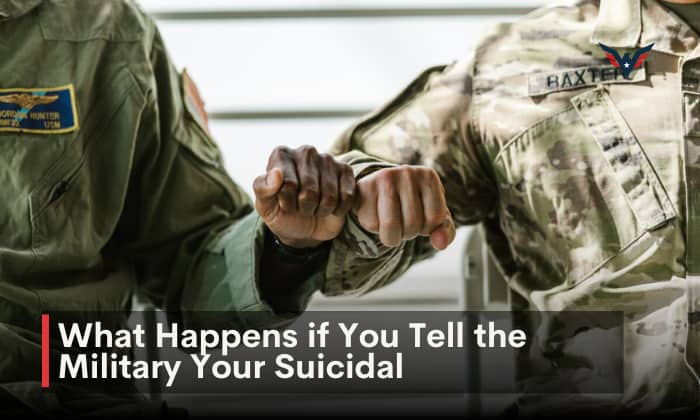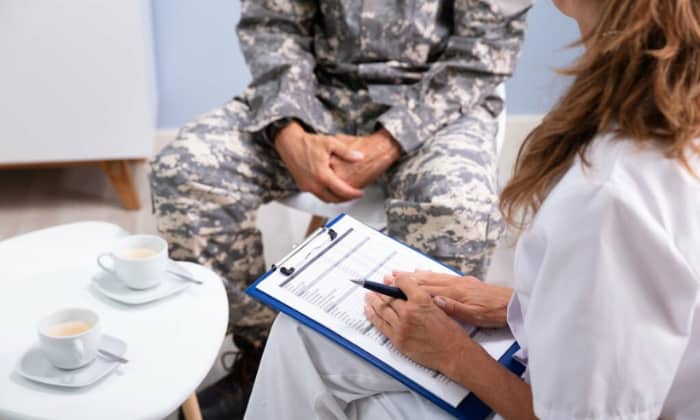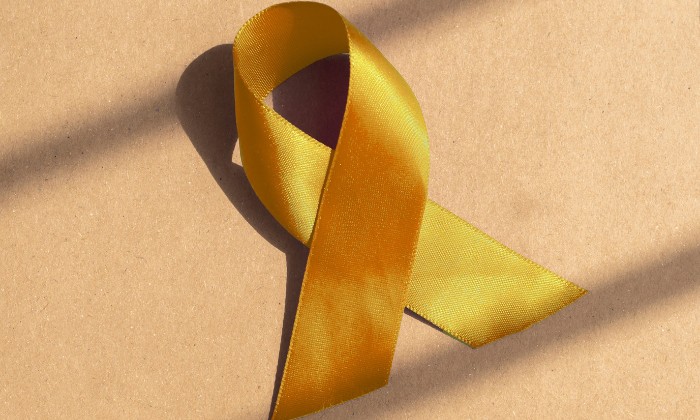Suicide prevention is an important issue to the military, and the Department of Defense has tracked suicide attempts and their underlying factors since 2008.
Overall, self-inflicted death continues to be a serious problem in the armed forces, where suicide rates have increased steadily since 2011.
As of 2022, the Marines had the highest suicide rate at 34.9 out of 100,000 members, followed by the Army, Navy, and Air Force. Common risk factors include a lack of social support, financial problems, substance abuse, and work-related problems.
So, what happens if you tell the military your suicidal?
- The commanding officer may schedule an emergency mental health evaluation and direct you to proper counseling services. The assessment is not a tool to punish soldiers, and seeking mental health assistance won’t hinder future promotions.
- As an option, service members may also avoid disclosing personal problems to their commander.
- They can simply state their need for assistance and receive help from medical professionals, including military doctors, who must respect the law protecting patients’ privacy, except in the case of immediate harm to the patients or other individuals (such as domestic abuse).
Table of Contents
What Happens if You Tell the Military You’re Suicidal?
If you have suicidal thoughts and have requested assistance from the military, the following may happen.
- A suicide risk assessment with qualified mental health professionals, who can talk to military leadership and people close to you to understand your situation better
- Following this assessment, hospitalization may be required, depending on the service member’s health. If hospital stays are not appropriate, outpatient treatment will often be the chosen option.
- In the case of hospitalization for suicidal ideation, reevaluations and post-discharge appointments will be necessary to promote service members’ health and provide ongoing support.
- During this process, the military may put service members on limited duty, reassignment, and/or limit their access to weapons at home and their time alone while on-base or working.
If the diagnosis is particularly serious (i.e., the service members may hurt themselves or others), the military will briefly relieve them of their flying duties.
- In situations where neither outpatient treatment nor hospitalization is possible (either because of refusal on the patient’s part or the risks not being considered imminent or high), military leaders and medical providers will collaborate to monitor the service member’s state of health and foster peer support.
Benefits of Seeking Help
Mental illness, though still a sensitive topic, carries much less stigma nowadays than it did in the past.
While there may be some people who will judge you if you want to kill yourself, the military doesn’t, and seeking help for psychological issues won’t result in a military discharge or hurt your career.
In fact, good mental health is essential to professional success, and it’s tough to work if you’re battling insomnia, mood changes, severe stress, or anxiety frequently (which are all warning signs of suicide).
The military also offers free or low-cost resources for veterans and service members seeking help, which we’ll list below.
Resources for Help
- Military OneSource
- Military Crisis Line (call 988 and press 1 or chat online at veteranscrisisline.net)
- National Suicide Prevention Hotline (1-800-273-8255)
Conclusion
What happens if you tell the military your suicidal? The good news is the armed forces will provide you with the help you need, should you decide to be open about your mental health.
For those struggling with suicide grief, there are organizations offering peer support as well, such as the nationwide TAPS program (or Tragedy Assistance Program For Survivors) and Once A Soldier, a nonprofit that focuses on financial assistance for families of fallen veterans.

For an ex-serviceman, it is a pleasure for me to continue my work in The Soldiers Project. This site is built with the target to help people who work in security jobs and other people to gear themselves with high-quality equipment. It is essential for many duties that they have the protection required to perform with safety.




